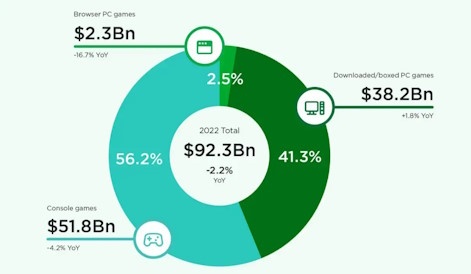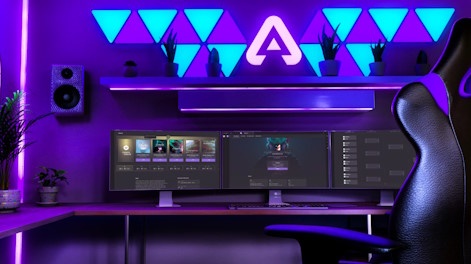This is a guest column by Nicolas Gilot, Co-CEO of Ultra.
Most PC gamers have a pile of shame. Thanks to deals that were too good to turn down or just FOMO on the hottest new release, all on the promise that you’ll ‘get around to it’, an ever-increasing library of titles steadily builds up, many of which are destined never to be played.
These untouched, unloved games gradually become a burden and can even create a sense of guilt when it’s time to pull the trigger on another purchase. Maybe I should play one of those games in my digital graveyard first? Is the money spent on another title really warranted if I don’t play everything I buy? Will I be marched through the streets of King’s Landing by a bell-tolling nun if I buy yet another game I won’t play?
At present, for PC gamers who buy digitally—which, let's be honest, is now the vast majority of consumers—a lack of real ownership means there's little to no recourse to recoup a single cent on games you’ve never played or even the ones you have. And it’s time that changed.
Freeing up funds
When it comes to physical boxed games, consumers can spend a premium on a new release, safe in the knowledge that they truly own that copy. In fact, a large pre-owned market exists for players who want to sell on their games, freeing up money for other purchases, such as a new title.
In the digital space, this just isn’t possible (or, more accurately, just isn’t allowed), and this has the potential to effectively price out large parts of the consumer base that simply can’t find or justify the funds to buy another full-priced game.
A pile of shame—or even just a library of games that have been played but are no longer of interest—keeps money tied up. Players might just simply decide to dive into their back catalogue rather than spend again. Yes, that money may already be safely in the pockets of publishers, but GameDiscoverCo notes that as large backlogs of unplayed games have continued to grow, “people may be incrementally less likely to impulse buy games that seem non-essential”.
Meanwhile, to attract attention and garner more sales, developers are pressured into putting discounts on their titles rather than trying to maximise premium prices over a longer period of time. it should be noted, of course, that there are still plenty of good marketing factors that can drive those decisions.
Archaic terms and conditions
Despite paving the way for extraordinary growth in the sector—Newzoo claims PC games generated $38.2 billion in 2022— digital PC marketplaces have been slow to make big changes that favour developers or consumers and have long tried to retain terms that favour themselves.

And much like in the mobile sector, where pressure is being applied to the archaic 30% revenue share that most platform holders take, the squeeze has also had to be applied on that royalty fee in the PC space. These attempts have been somewhat more successful, resulting in at least some concessions from certain leading PC games marketplaces, while other competitors offer lower fees.
But the pre-owned market is the biggest change yet to be made. Ownership is effectively retained by the seller. It’s not just an issue exclusive to digital games, of course, it’s the same situation that exists on other marketplaces for non-gaming purchases like TV, film and music. There’s little to no ownership for consumers in the digital space. Transactions are effectively an indefinite loan, while the seller retains all the rights.
It’s time this one-sided deal between big corporations and consumers came under the spotlight. By opening up a pre-owned games market on digital storefronts, players would finally get ownership of what they buy, and it opens up a chance for both customers and developers to make money on repeat purchases.
Digital ownership revolution
The pre-owned physical market is a sore subject for many publishers. While consumers can recoup some cash when selling a title on, it’s the retailers that see the upside, while developers and publishers receive nothing. But digital offers an opportunity to revolutionise this market to benefit everyone involved, in a completely transparent manner.

Firstly, if developers are able to set the terms for the pre-owned market - something Ultra is currently pioneering with a number of publishers - such as the floor for sell-on prices, they can limit exposure to cannibalisation of full-price sales while opening up their potential customer-base to players who lack the funds for full premium purchases. What’s more, developers can take a cut of that repeat sale, while the player selling has received money that can be spent on a new PC game purchase and, crucially, gets out from under their pile of shame.
The consumer unfriendly terms of not truly owning games (or other entertainment media) online seems to have become an accepted fact. That’s just the way it is. But with other archaic business models that favour platform holders coming under scrutiny, there should also be a discussion over what ownership consumers get of the things they buy in the digital space. They deserve a better deal over their purchases and terms that don’t lock them in forever or create a negative buying experience.
The pile of shame will never be fully eradicated. Players will always feel they’ll ‘get around to it’ eventually. But a pre-owned digital marketplace has the potential to create a healthier market for players that puts them back in control, just like with their physical titles. Only this time, developers can take a cut, too.
This is a guest post by Nicolas Gilot of Ultra. With a wealth of experience in founding and directing various gaming-related ventures in China, Nicolas knows what it takes to create compelling game experiences that resonate with audiences. Nicolas joined forces with his long-time friend David Hanson, co-CEO, to establish Ultra, a platform designed to revolutionise the PC gaming experience. Since its inception in 2017, Ultra has grown to become a team of 90 professionals. Ultra is a complete PC video gaming ecosystem built around a next-generation PC games store, bridging the gap between web2 and web3 gaming. You can read more about web3 gaming and Ultra at our partner site BlockchainGamer.biz.

















